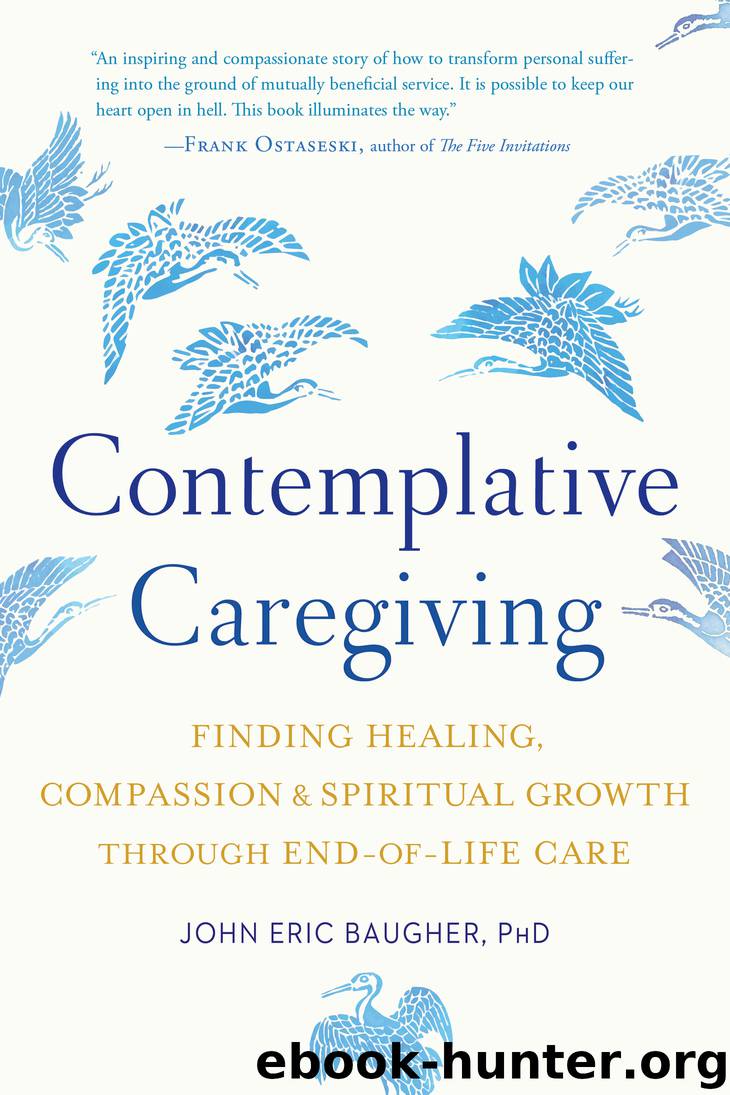Contemplative Caregiving by John Eric Baugher

Author:John Eric Baugher [Baugher, John Eric]
Language: eng
Format: epub
Publisher: Shambhala
Published: 2019-04-16T00:00:00+00:00
Hospice work can be transformative for caregivers because it provides opportunities for releasing expectations, journeying with uncertainty, and contemplating one’s experience beyond the dualistic categories that limit perception and structure much of everyday life. As with formal meditation or other mindfulness practices, contemplative caregiving can be a means to expand one’s sense of possibility, to see relationships and moments in a new light. Being perfect is not required of us as caregivers. Instead, our perfection is found in our willingness to witness our reactions and judgments and to stretch ourselves to live into our deepest intentions to care. Signing up to care for those who are dying and grieving is asking for a mirror of awareness to be held up to us. Contemplative caregiving involves a willingness to look into that mirror with a loving curiosity that, in turn, extends outward to those in our care.
As caregivers, we may at times accompany those who grate on us, or we may be asked to enter situations or witness dynamics that will turn our stomach or bring up irritation or anger. Compassionate caregiving does not require that we like those in our care or that we like what we are being asked to experience. No one likes the smell of an open tumor or the scene of family members upsetting someone close to death. Yet we can abide with it all as a loving witness to what is going on around us and churning around inside of us. Taking the compassionate stance of a witness allows for a generosity of interpretation, not jumping to conclusions about the meaning of another’s behavior and thereby putting up a wall. Instead, we can use our own reactive and judgmental mind as an opportunity to move toward another, as well as the self, and to inquire more deeply into what he or she may be experiencing in the moment.
We may never know for certain what another is experiencing or precisely why they are responding to their current situation as they are. Contemplative caregiving, instead, involves recognizing that things are not always as they appear, and that what appears is not all there is to see. This stance invites us to continually open ourselves with curiosity to the mystery of the human encounter. In chapter 6, we move on to explore the basic fact that something has made possible our participation in that mystery in the first place. In opening their lives to our presence, dying people and their families offer us a gift of relationship. Recognizing this fundamental truth, we can return again and again to experiencing contemplative caregiving not as a one-way street but as a reciprocal relation of care.
Download
This site does not store any files on its server. We only index and link to content provided by other sites. Please contact the content providers to delete copyright contents if any and email us, we'll remove relevant links or contents immediately.
| Codependency | Conflict Management |
| Dating | Divorce |
| Friendship | Interpersonal Relations |
| Love & Loss | Love & Romance |
| Marriage | Mate Seeking |
The 5 Love Languages: The Secret to Love That Lasts by Gary Chapman(9798)
Doing It: Let's Talk About Sex... by Hannah Witton(9279)
Should I Stay or Should I Go? by Ramani Durvasula(7664)
The Road Less Traveled by M. Scott Peck(7601)
The Lost Art of Listening by Michael P. Nichols(7501)
Daring Greatly by Brene Brown(6508)
Beartown by Fredrik Backman(5748)
We Need to Talk by Celeste Headlee(5613)
Men In Love by Nancy Friday(5237)
The Rules Do Not Apply by Ariel Levy(4961)
The State of Affairs by Esther Perel(4715)
How To Win Friends and Influence People by Dale Carnegie(4511)
Reflections Of A Man by Mr. Amari Soul(4290)
Pillow Thoughts by Courtney Peppernell(4278)
The Ethical Slut by Janet W. Hardy(4251)
Algedonic by r.h. Sin(4058)
Surrounded by Idiots by Thomas Erikson(4053)
He's Just Not That Into You by Greg Behrendt & Liz Tuccillo(3893)
I Love You But I Don't Trust You by Mira Kirshenbaum(3873)
